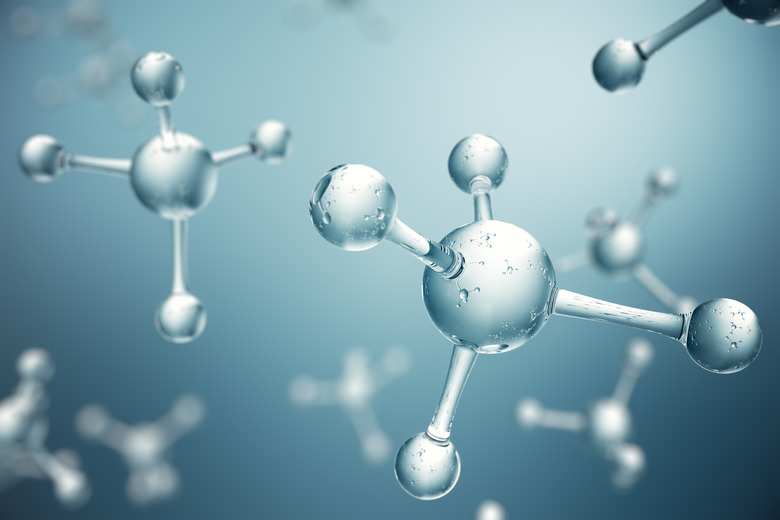How Is A Water Molecule Like A Magnet?
If you were able to see a water molecule (H2O) up close, it would look somewhat like a round head with two ears positioned at the 10 and 2 o'clock positions. Think Mickey Mouse. The "ears" are the two hydrogen ions while the "head' is the oxygen ion. Because the hydrogen ions carry a positive charge and the oxygen ion a negative one, this arrangement gives the molecule a net polarity, much like a magnet. This feature of the water molecule gives water four properties that make it indispensable for life. It has cohesion and a comparatively high boiling point, it is less dense in the solid state than the liquid state, and it is an exceptionally good solvent.
Magnetic Attraction
Magnetic Attraction
The structure of the water molecule is a distorted tetrahedron. The hydrogen ions form a 104.5-degree angle with the oxygen molecule. The result is that, while the molecule is electrically neutral, it has poles, just as magnets do. The negative side of of one molecule is attracted to the positive side of those around it. This attraction is known as hydrogen bonding, and while it isn't strong enough to break the covalent bonds keeping the molecules together, it is strong enough to produce anomalous behavior that distinguishes water from other liquids.
Four Anomalous Properties
Four Anomalous Properties
Cooks rely on the polar nature of water whenever they use a microwave oven. Because the molecules are like magnets, they respond to high-frequency radiation by vibrating, and the energy of these vibrations is what produces the heat to cook the food. This is one example of the importance of the polarity of H2O, but there are more important ones.
**Cohesion:** Because of the magnetic attraction water molecules exert on each other, liquid water tends to "stick together." You can see this when two water beads approach each other on a flat, smooth surface. When they get close enough, they magically merge into a single droplet. This property, called cohesion, gives water surface tension that insects with large feet exploit to be able to walk on the surface. It allows roots to suck water in a continuous stream and ensures that water flowing through tiny capillaries, such as veins, doesn't separate.
**High Boiling Point:** The boiling point of water isn't high when compared with some liquids, such as glycerin or olive oil, but it should be lower than it is. Compounds formed from elements in the same group as oxygen in the periodic table, such as hydrogen selenium (H2Se) and hydrogen sulfide (H2S), have boiling points that are 40 to 60 Celsius degrees below zero. Water's high boiling point is entirely due to the extra energy needed to break the hydrogen bonds. Without the magnetic attraction that water molecules exert on each other, water would vaporize at something like -60° C, and there would be no liquid water and no life on Earth.
**Ice Is Less Dense than Water:** The extra cohesion provided by hydrogen bonding compresses water together in the liquid state. When water freezes, electrostatic attraction/repulsion creates a lattice structure that is more spacious. Water is the only compound that is less dense in the solid state, and this anomaly means that ice floats. If it didn't, every marine ecosystem would die whenever the weather was cold enough for water to freeze.
**Water Is a Universal Solvent:** Because of its strong hydrogen bonding, water dissolves more substances than any other liquid. This is important for living beings that derive nourishment from nutrients dissolved in water. Most living beings also rely on electrolytes, which are water solutions containing ionic solutes, for transmission of bioelectric signals.
Cite This Article
MLA
Deziel, Chris. "How Is A Water Molecule Like A Magnet?" sciencing.com, https://www.sciencing.com/how-is-a-water-molecule-like-a-magnet-13712174/. 20 April 2018.
APA
Deziel, Chris. (2018, April 20). How Is A Water Molecule Like A Magnet?. sciencing.com. Retrieved from https://www.sciencing.com/how-is-a-water-molecule-like-a-magnet-13712174/
Chicago
Deziel, Chris. How Is A Water Molecule Like A Magnet? last modified March 24, 2022. https://www.sciencing.com/how-is-a-water-molecule-like-a-magnet-13712174/
